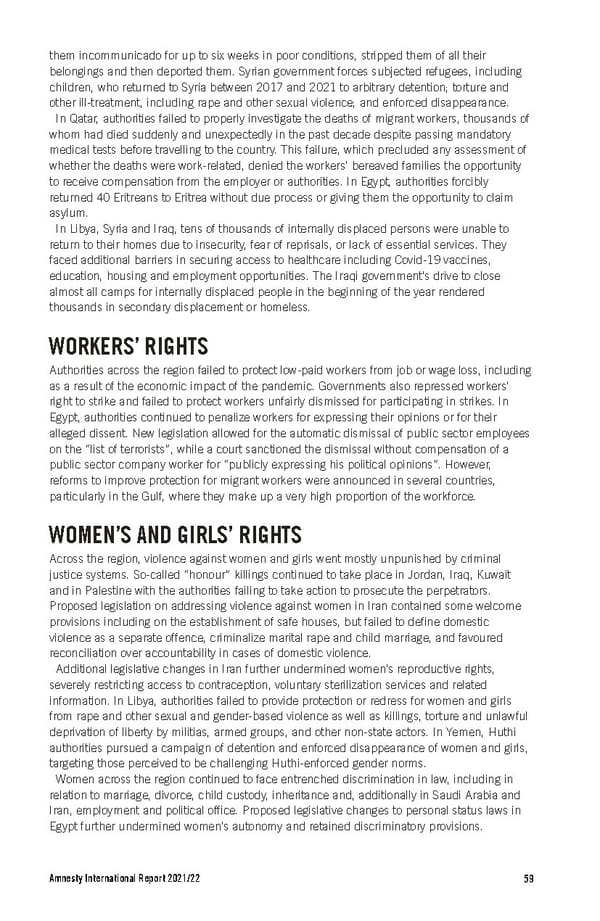them incommunicado for up to six weeks in poor conditions, stripped them of all their belongings and then deported them. Syrian government forces subjected refugees, including children, who returned to Syria between 2017 and 2021 to arbitrary detention; torture and other ill-treatment, including rape and other sexual violence; and enforced disappearance. In Qatar, authorities failed to properly investigate the deaths of migrant workers, thousands of whom had died suddenly and unexpectedly in the past decade despite passing mandatory medical tests before travelling to the country. This failure, which precluded any assessment of whether the deaths were work-related, denied the workers’ bereaved families the opportunity to receive compensation from the employer or authorities. In Egypt, authorities forcibly returned 40 Eritreans to Eritrea without due process or giving them the opportunity to claim asylum. In Libya, Syria and Iraq, tens of thousands of internally displaced persons were unable to return to their homes due to insecurity, fear of reprisals, or lack of essential services. They faced additional barriers in securing access to healthcare including Covid-19 vaccines, education, housing and employment opportunities. The Iraqi government’s drive to close almost all camps for internally displaced people in the beginning of the year rendered thousands in secondary displacement or homeless. WORKERS’ RIGHTS Authorities across the region failed to protect low-paid workers from job or wage loss, including as a result of the economic impact of the pandemic. Governments also repressed workers’ right to strike and failed to protect workers unfairly dismissed for participating in strikes. In Egypt, authorities continued to penalize workers for expressing their opinions or for their alleged dissent. New legislation allowed for the automatic dismissal of public sector employees on the “list of terrorists”, while a court sanctioned the dismissal without compensation of a public sector company worker for “publicly expressing his political opinions”. However, reforms to improve protection for migrant workers were announced in several countries, particularly in the Gulf, where they make up a very high proportion of the workforce. WOMEN’S AND GIRLS’ RIGHTS Across the region, violence against women and girls went mostly unpunished by criminal justice systems. So-called “honour” killings continued to take place in Jordan, Iraq, Kuwait and in Palestine with the authorities failing to take action to prosecute the perpetrators. Proposed legislation on addressing violence against women in Iran contained some welcome provisions including on the establishment of safe houses, but failed to define domestic violence as a separate offence, criminalize marital rape and child marriage, and favoured reconciliation over accountability in cases of domestic violence. Additional legislative changes in Iran further undermined women’s reproductive rights, severely restricting access to contraception, voluntary sterilization services and related information. In Libya, authorities failed to provide protection or redress for women and girls from rape and other sexual and gender-based violence as well as killings, torture and unlawful deprivation of liberty by militias, armed groups, and other non-state actors. In Yemen, Huthi authorities pursued a campaign of detention and enforced disappearance of women and girls, targeting those perceived to be challenging Huthi-enforced gender norms. Women across the region continued to face entrenched discrimination in law, including in relation to marriage, divorce, child custody, inheritance and, additionally in Saudi Arabia and Iran, employment and political office. Proposed legislative changes to personal status laws in Egypt further undermined women’s autonomy and retained discriminatory provisions. Amnesty International Report 2021/22 59
 Amnesty International Report 2021/22 Page 58 Page 60
Amnesty International Report 2021/22 Page 58 Page 60